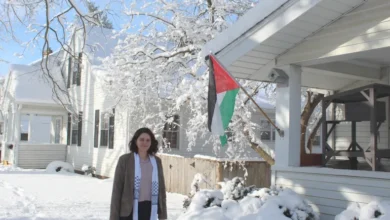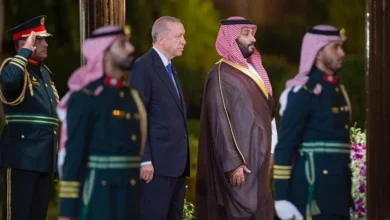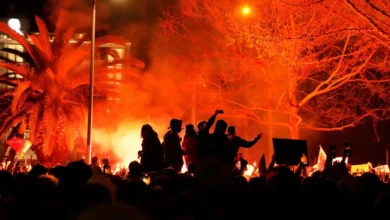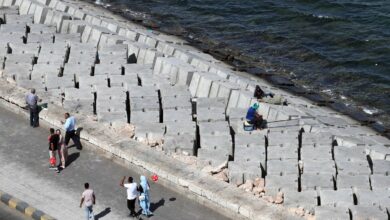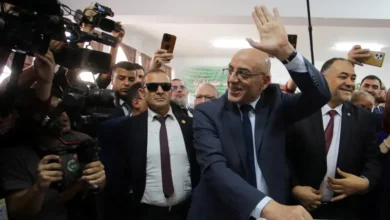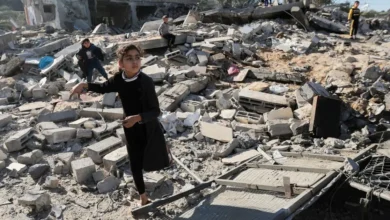‘I am not an anti-Semite’: Pro-Palestine artists cancelled across Europe
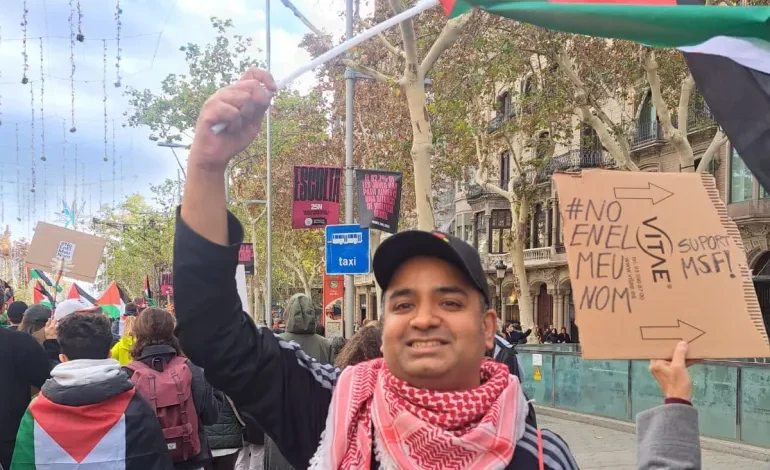
In early October, when Israel began bombing Gaza, Bangladeshi photojournalist Shahidul Alam was busy co-curating a planned photography exhibition in Germany.
Feeling worried, he took a break from his work and took to social media to decry Israel’s attacks on the densely populated Palestinian enclave.
Alam is no stranger to human rights abuses and speaking his mind.
In 2018, he was celebrated in Time magazine for his decades-long career documenting political unrest in Bangladesh. That year, he was detained for more than 100 days, accused of “false” statements after criticising Prime Minister Sheikh Hasina in an interview.
Since the onset of Israel’s war on Gaza, Alam has posted about the conflict dozens of times on Facebook to his 114,000 followers.
On October 8, one post read: “The news of semi-naked Israeli bodies being paraded is horrendous and cannot be justified … I feel for all Palestinians and Israelis lives destroyed.”
Another, on October 29, said: “This weekend’s horrific violence is the ugly reality of Israeli apartheid, the rotten fruit of decades of occupation of a stateless people divested of basic rights and freedoms.”
On November 21, the German Biennale for Contemporary Photography dropped the veteran shooter, accusing him of anti-Semitism.
“Various posts by Shahidul Alam on his Facebook channel after October 7 have given a platform to content that can be read as anti-Semitic and anti-Semitic content,” it said.
Alam’s two Bangladeshi co-curators, Tanzim Wahab and Munem Wasif, resigned in solidarity, prompting organisers to scrap next year’s exhibition tour of three German cities.
They said that among the allegedly anti-Semitic posts were an “uncommented interview by Shahidul Alam with the Palestinian ambassador to Bangladesh, a comparison of the current war with the Holocaust, and accusations of genocide by the state of Israel against the Palestinian population in Gaza”.
They also complained that Alam had not deleted “racist and other comparable comments” against Israelis from his page, ostensibly made by some of his followers.
Alam, Wahab and Wasif deny the allegations.
“We have a moral responsibility to decide which side of history we will stand on,” they said in a statement on Tuesday.
Alam told Al Jazeera: “I am an anti-Zionist which means I am against colonialism, settler colonialism, against racism, against apartheid and genocide.
“I am not an anti-Semite, and it’s most unfortunate that Germany chooses to conflate the two, [as this] serves and furthers the white supremacist agenda.”
The episode is one of many high-profile fallouts across the Western arts world in recent weeks over the Middle East war, focused on accusations of anti-Semitism.
Several tense cases are focused in Germany, which has a special responsibility to Israel given its history arising from the Holocaust. However, artists, protesters and activists say Berlin’s crackdown confuses criticism of Israeli policies with anti-Jewish racism.
‘Extremely distressing’
Israel began bombing Gaza after Hamas, which governs the densely populated Strip, attacked southern Israel, killing about 1,200 Israelis and kidnapping more than 200. To date, Israel’s strikes, officially aimed at crushing the Palestinian group, have killed more than 15,000 people, among them many children.
In the wake of the Hamas attack, the Frankfurt Book Fair “indefinitely postponed” an appearance by Palestinian author Adania Shibli, who was due to receive a prize for her novel Minor Detail on October 20.
On November 13, Haitian-born curator Anais Duplan was left “speechless” after his Afrofuturism exhibition at Germany’s Museum Folkwang was abruptly cancelled by the museum’s director Peter Gorschluter.
Gorschluter said Duplan’s social media posts “do not acknowledge the terroristic attack of the Hamas and consider the Israeli military operation in Gaza a genocide”.
Meanwhile, several artists have resigned from their posts at the renowned German modern art exhibition, Documenta, in a showdown that has dominated Europe’s cultural headlines for weeks.
On November 16, most of the exhibition’s six-member finding committee quit in solidarity with Ranjit Hoskote, who had quit days earlier after a German daily, Suddeutsche Zeitung, revealed that he had signed a 2019 letter published by the Indian arm of the Boycott, Divestment, Sanctions (BDS) movement.
That letter prompted German accusations of anti-Semitism against Hoskote, a writer and curator.
